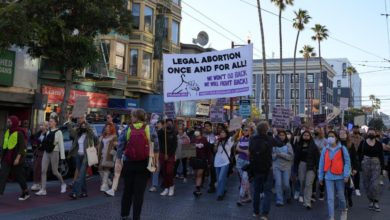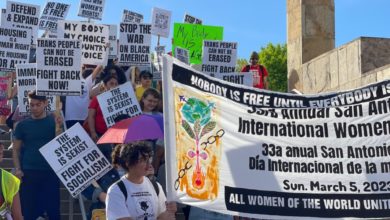Trump’s one-year anniversary as president was met with 50,000 protesters rallying and marching through the streets of San Francisco on Jan. 21, the same day the government shut down. Chants of “No Trump, no KKK no sexist USA” made it clear that the march was political in orientation, and that “Time’s up!” for Donald Trump, Mike Pence, racism and bigotry.
Organized by the Women’s March under the banner “Hear Our Vote,” the intention of the event was to draw people away from direct action and into spectatorship of electoral politics. Both rally and march contained contradictory political elements that narrowly focused on identity politics, yet even this fact was overshadowed by the sheer numbers of people that attended, all outraged by the blatant racism and misogyny of Trump.
Bay Area resident Ali Gali noted that the hyper-focus on identity politics by the Democratic Party is “degrading,” as “it comes down to [a] physical representation rather than an ongoing questioning of what is happening to our bodies.” The struggle, she said, is not just here right now but part of a larger global struggle.
“We are part of an ongoing fight that started many centuries ago, and keeps going and happening across the globe. This fight is not just the liberation for the woman, of course it is the liberation of the woman, but that liberation involves a stance against imperialism, systems of patriarchy, and systems of capitalism,” Gali said. “We must fight for a society that’s not just asking for a reform but transformation and revolution.”
The events of 2017 have not been forgotten. Some carried the portrait of Charlottesville martyr Heather Heyer, who was murdered by a white supremacist last year while defending the city against the neo-Nazi groups. Many chanted, “You build a wall? We tear it down!” in opposition to Trump’s racist southern border wall.
Internationalism also shone through as many carried placards depicting 16-year-old Palestinian political prisoner Ahed Tamimi. Tamimi is currently facing more than 10 years in Israeli prison for defending her home from IDF soldiers who shot her cousin in the head with rubber-coated steel bullets.
Palestinian flags waved throughout the march, and people chanted in unison, “Long live Palestine! Free Ahed Tamimi!”
Kate Rafael from Queers Undermining Israeli Terrorism brought placards of Ahed to distribute. “Ahed represents to us the hundreds of Palestinian kids who are arrested by the Israeli military,” she said.
More than 700 Palestinian children are arrested, detained and prosecuted every year in military courts with 99.97% conviction rates. “Offenses” such as throwing rocks, attending a protest or liking a pro-Palestinian post on Facebook can carry 20-year sentences in prison, and many children are tortured at the hands of the IDF.
“I spent a couple of years in Palestine and knew the stories [of the child prisoners],” Rafael explained. “I worked with their families to get them out and get them bail. I hope that people will understand that Ahed’s a symbol of a much larger problem that’s all of our problem.”
“Internationalism is just so core to who I am,” Rafael explained, and she recounted living through the AIDS crisis in the gay community in San Francisco. “It was leftists — people who came out of that internationalist tradition — who took the lead. That’s our place, to always introduce these issues. We’re all here, and it’s really important to show that we’re all here. We really wanted Ahed’s face to be present in every women’s march in the country.”
The Israeli government puts a huge effort into dehumanizing Palestinians, Rafael said, and “the Palestinians fight their resistance every day, defying that, and it’s our obligation to let them know we see their struggle, and we stand in solidarity.”
The women’s movement is indeed much larger than reproductive rights. People marched in solidarity with unions, DREAMers, living wages, climate justice and Black lives, among many others. Nikki, a student at SF State, explained that “Feminism means supporting everyone.”
Women’s issues also encompass access to jobs, housing and education
Local student Claudine Guevara noted, “I’m a student and I have to worry about healthcare and rent; I would like to live in a world where those things are not worries but human rights.”
Guevara explained that she supported a woman in the last election: Gloria La Riva, from the Party for Socialism and Liberation who ran on the Peace and Freedom Party ticket for president. La Riva’s campaign was for working people and immigrants, Guevara said, and they were in line with what we are fighting for, liberation for all.
“The Party for Socialism and Liberation is a step to our future.” Guevara declared. “Our future is not with the Democrats, they [and the Republicans] are just two sides of the same coin.”
Nowhere has this been more clear than the silence from the Democratic Party as they expand Trump’s mass surveillance powers, support his attacks on the Palestinian people, and gush over the massive military build-up in the last year. Nancy Pelosi famously declared abortion as “fading” in importance, indicating the ever-rightward move of the Democrats.
“If we’re really fighting for change,” Guevara said, “then we have to stay away from the status quo, which is the two-party system. We need something new that has a better outlook understanding of what the popular masses really need, want and deserve.”
“Feminism to me is understanding that our liberation as women also lies in the liberation of Black people, of Palestinians, of all the struggling people in the world. It starts with us,” Guevara said. “We deserve equal to everyone and so does the rest of humanity.”
Oxfam recently released their annual inequality report, showing that billionaires in 2017 gained almost half a trillion dollars in wealth, enough to end “global extreme poverty seven times over.” This massive wealth only exists on the brutal, massive poverty of the rest of the world.
Once we decide not to accept the oppression anymore, Guevara stated, we can start seeing the connections around the world, and that our oppression as women only exists because of the oppression of others. “The struggle unites us.”
(Erika Hidalgo contributed to reporting on this article.)






